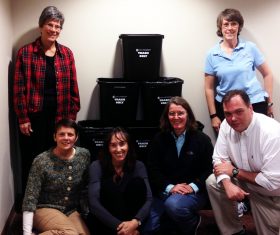Using one centrally located trash can, instead of relying on the ones beside faculty members' desks, improved the Department of Physical Therapy Education's recylcing efforts.

In many offices in the Department of Physical Therapy Education the number of bins beside the desks of faculty are already on the decline. They disappeared by force, charm and discussion. The driving force behind this sudden disappearance? Janet Cope, associate professor of physical therapy education.
Cope is a member of the Environmental Advisory Council so she is well aware of Elon’s sustainability initiatives. She realizes Elon’s success in achieving its sustainability goals requires help from every member of the community, not just the Office of Sustainability.
“Thinking about all the changes that need to be made, that could be made, at Elon, in the U.S., globally, we can be overwhelmed by what we can’t do,” she says. Cope wasn’t discouraged and began asking where she could make a difference on campus.
Her answer was to focus on landfill waste reduction efforts in her own neighborhood. Waste was a topic that made sense to Cope because she grew up immersed in the recycling conscious culture of Western Massachusetts. With sustainability principles weaved into the LEED Silver certified building and the work being done at the Gerald L. Francis Center, addressing occupant behavior was one more way to add to sustainability efforts at the School of Health Sciences.
Cope began asking questions about what is and is not recyclable and sharing the information with her colleagues through a monthly “trash talk” email. She arranged for the Office of Sustainability to give a quick lunch and learn to clarify for students and employees what items can be recycled, where the trash goes, and why this is important to our health and Elon’s greenhouse gas emissions.
At the suggestion of her colleague Jane Freund, Cope also began collecting trash cans from offices and asking that colleagues use one centrally located bin instead. If nothing else she figured “at least it’s one less plastic bag (trashcan liner) in the garbage.”
At a faculty meeting, challenges of the one-week trial were discussed, addressed and it was decided that the trial would continue through January. With the support of Elizabeth Rogers, dean of the School of Health Sciences, Cope will be expanding her efforts by speaking about the experience with all the health sciences faculty at their next meeting.
For those interested in trying something similar in their department, Cope recommends getting buy-in from at least a few colleagues and building from there.
Cope and her cooperative colleagues will likely continue striving to reduce waste where possible. “This year recycling, next year composting,” Cope says.
It all adds up
Recyclables placed in the trash go to the Uwharrie Landfill in Troy, N.C.
Mind the bin:
- Blue = ALL paper and paperboard (cardboard goes beside the bin)
- Green = plastics #1-7 (This includes almost all plastic, not just beverage bottles), glass (all colors), metals (e.g., drink and soup cans)
Try it in your space:
8,000 bags per month or 72,000 bags per academic year could be kept out of the landfill simply by not using the trash can beside your desk. This calculation is based on bags from an estimated 1,000 personal trash cans being changed on average of two times a week.
Links:


